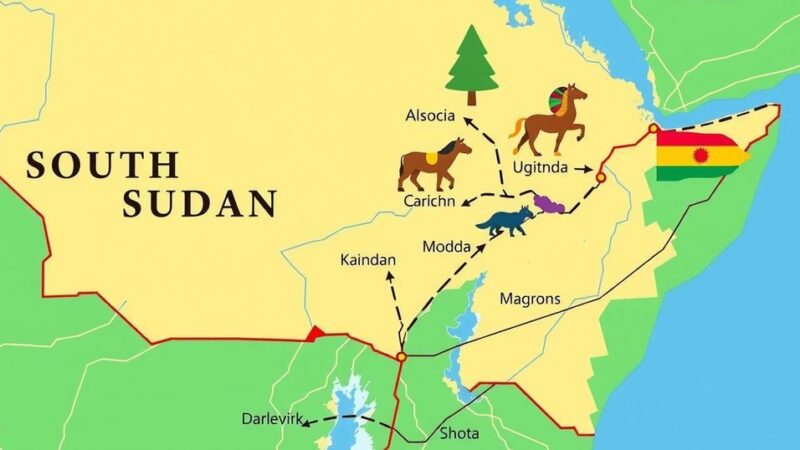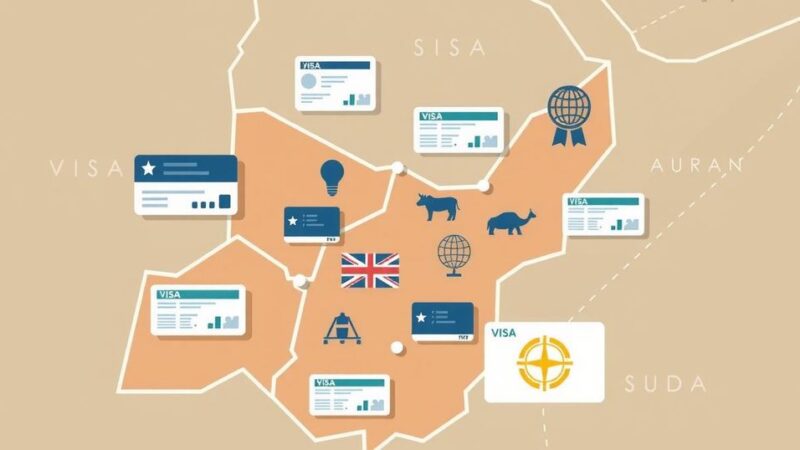Turkey has called on the EU to unconditionally lift sanctions on Syria before the upcoming conference aimed at supporting recovery efforts. Scheduled for March 17, 2025, the conference will include Syria’s interim government for the first time and addresses essential humanitarian challenges. Officials emphasize the importance of lifting sanctions to promote stability and recovery in the war-torn country.
Turkey has urged the European Union to remove sanctions imposed on Syria without any conditions, a call made as the EU prepares for the 9th International Conference on Syria scheduled for March 17, 2025. This appeal is seen as essential for enabling what Turkey describes as a peaceful transition, particularly following the recent political turmoil following the ousting of former President Bashar al-Assad.
The forthcoming conference aims to garner international support for Syria’s recovery efforts, featuring participation from representatives of Syria’s interim government for the first time. The EU anticipates that this inclusion will create new momentum to address the significant humanitarian challenges currently facing the country.
Turkey’s foreign ministry has articulated that ensuring Syria’s economic security is vital for national stability. Consequently, they argue that sanctions must be lifted, emphasizing this change as a means to foster economic opportunities and employment. “The sanctions must be lifted unconditionally and for an indeterminate period,” remarked the ministry, underscoring the importance of such measures.
Recently, the EU announced a slight easing of certain sanctions in Syria’s energy, transport, and banking sectors to support the country during its transition. Turkey’s stance on reconstruction is particularly meaningful since it currently hosts nearly three million Syrian refugees and is advocating for their safe return as reconstruction progresses.
Deputy Foreign Minister Nuh Yilmaz will represent Turkey at the conference, where he will address the need for international backing in Syria’s transition and the creation of economic opportunities for returning refugees. His statements are expected to emphasize the hindrance that current economic sanctions pose to recovery efforts.
The conference is poised to serve as an essential platform not only for financial commitments but also for reassessing relationships with the new Syrian authorities. Kaja Kallas, High Representative for Foreign Affairs and Security Policy, acknowledged the severe humanitarian crisis intensified by recent violence, but also noted the potential for optimism arising from new regional agreements. “This is a time of dire needs and challenges for Syria,” Kallas stated, highlighting the ongoing instability as the interim forces consolidate their governance.
Despite notable challenges, Kallas underscored the unique opportunity presented by this year’s conference. An agreement made on March 10, 2025, between the Syrian interim authorities and the Kurdish-led Syrian Democratic Forces to unify operations is viewed as a progressive step. Kallas reaffirmed the EU’s long-standing commitment to support the Syrian population through crises and toward recovery.
Since the commencement of the Syrian civil war over 13 years ago, the EU has emerged as the largest donor, allocating more than €35 billion (approximately $38.2 billion) for humanitarian aid and developmental efforts. The forthcoming conference is critical for optimizing fundraising and maintaining international involvement in Syria’s recovery phase.
Hadja Lahbib, the Commissioner for Equality, accentuated the importance of focusing on recovery and transitional stability, asserting, “The EU stands with the Syrian people on their path to recovery, peace, and a secure future.” Collaborative efforts among nations committed to reform and aid are deemed crucial in this process.
The path to recovery is laden with obstacles, with around 16.5 million individuals in Syria needing humanitarian assistance, and 12.9 million of those requiring food aid. The longstanding conflict has devastated the economy, leading to severe poverty and dire living conditions for many citizens, necessitating immediate intervention.
Senior officials from various countries and international organizations will attend this conference with a unified aim of supporting Syria during this pivotal transitional phase. The event is expected to generate substantial pledges focused on comprehensive recovery, extending beyond financial aid to encompass improvements across multiple sectors contributing to holistic recovery.
The upcoming Brussels conference, underscored by Turkey’s urgent request for the unconditional lifting of sanctions, encapsulates the broader efforts toward stability and peace in Syria, offering a crucial opportunity for all Syrians to rebuild their nation.
In summary, Turkey’s call for the unconditional lifting of sanctions on Syria highlights the urgent need for international support in the country’s recovery process. The upcoming EU conference aims to address significant humanitarian issues and facilitate a peaceful transition. With representatives from Syria’s interim government participating, the conference represents an opportunity to reshape relations and provide necessary economic support for rebuilding efforts.
Original Source: evrimagaci.org






